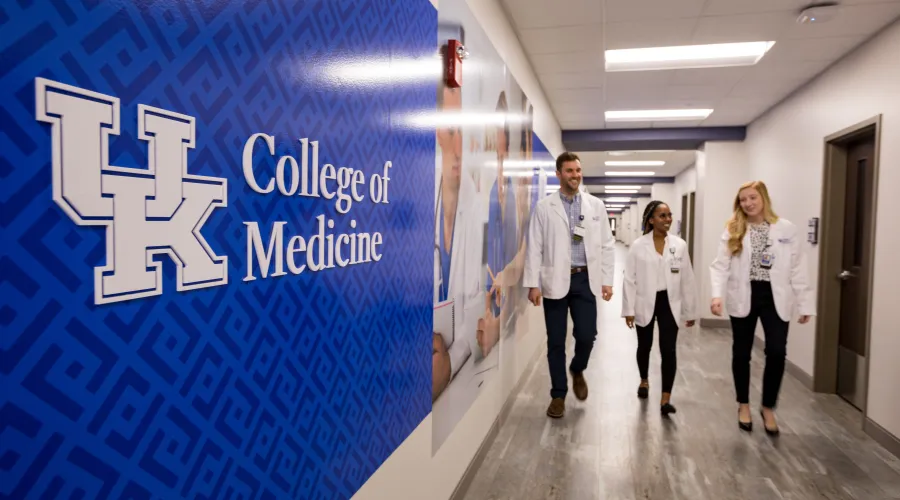
College of Medicine
Clinical and Translational Science
The UK Center for Clinical and Translational Science (CCTS) brings together clinicians, researchers, and communities to accelerate the translation of basic science discoveries to tangible improvements in health. With the support for a Clinical and Translational Science Award from the National Institutes of Health, we foster innovative team science across multiple campuses and states. We provide infrastructure, funding, and research support services, and train the upcoming generation of clinical and translational researchers. The primary emphasis of the program will be mentored training in the conduct of research leading to well-reasoned original contributions to knowledge in health and treatment of disease. The program will support the development of the next generation of academically innovative, productive, and transformative researchers and leaders in CTS and support the development of the academic discipline of CTS at the University of Kentucky.
Director of Graduate Studies: Hannah Knudsen, PhD
Molecular and Cellular Biochemistry
Medicine continues to advance at a rapid pace, thanks in large part to the progress made in biomedical research. Biochemistry continues to play a key role in understanding the underlying causes and potential treatments for many diseases including cancer, neurodegenerative disorders such as Alzheimer’s and Parkinson’s diseases, diabetes, and heart disease, to name but a few.
Director of Graduate Studies: Trevor P Creamer, PhD
Microbiology, Immunology and Molecular Genetics
There are more than 30 faculty in the microbiology graduate program with research activities focused in six areas: molecular biology, immunology, tumor biology, cell biology, microbial pathogenesis, and virology. The training program is flexible and blends an appropriate mixture of didactic courses, seminars, research and independent study for each student. Emphasis is placed on training students to become successful independent researchers and our laboratories provide excellent training opportunities in state-of-the-art research in basic science and medically related areas.
Director of Graduate Studies: Kenneth Fields, PhD
Neuroscience
An energetic faculty and flexible curriculum are directed toward giving the graduate competitive research and teaching credentials. Research in the department of anatomy and neurobiology is focused on range of disciplines related to the nervous system. State-of-the-art approaches to the structure and function of neural, neuroendocrine and reproductive systems, as well as a research on neurodegeneration, regeneration, and imaging represent particular strengths of the department.
Director of Graduate Studies: Wayne Cass, PhD
Pharmacology and Nutritional Sciences
The UK College of Medicine Department of Pharmacology and Nutritional Sciences faculty are trained in the individual disciplines of pharmacology and/or nutritional sciences, with research emphases in the areas of brain cognition and aging, cancer, cardiovascular and metabolic diseases (e.g., obesity, diabetes). This multidisciplinary and collaborative research environment focuses on the development of nutritionally-based concepts and pharmacologic entities for the treatment of chronic diseases. Since nearly every chronic disease is prevented and/or treated by a combination of life-style (e.g., nutrition) and pharmacologically-based therapies, the department's unique combination of research capabilities and expertise in these disciplines promises to have an immense impact on addressing chronic disease processes. The graduate program emphasizes training in state-of-the-art laboratory methods in molecular and biomedical pharmacology. Opportunities are available to work with enthusiastic faculty in intriguing research fields such as Alzheimer's disease; brain aging and neurodegenerative diseases; calcium signaling and ion channels; cancer and metastasis; cardiovascular disease; memory and cognition; regulation of gene expression by growth factors, nuclear receptors, and transcription factors.
Director of Graduate Studies: Nancy R. Webb, Ph.D.
Physiology
The UK College of Medicine Department of Physiology is a large, diverse community with 32 primary faculty. Our faculty investigate mechanisms of physiological function and dysfunction at the molecular, cellular, organ system and behavioral levels. Our scientific expertise provides outstanding research training opportunities in neurophysiology, cardiovascular biology, endocrinology, muscle biology, sensory physiology, and renal biology. Recent MD/PhD students have focused on the clinically relevant areas of aging, atherosclerosis, Alzheimer’s disease, stroke, and spinal cord injury.
Director of Graduate Studies: Ken Campbell, PhD
Toxicology and Cancer Biology
The UK College of Medicine Department of Toxicology and Cancer Biology is a multidisciplinary unit for research and graduate education in the broad areas of toxicology. The program was founded in 1969 in the Graduate School, as one of nation’s first PhD programs in toxicology and moved to College of Medicine in 2004. Our education mission is to provide students with an education in toxicology that is based on an understanding of biochemistry, physiology, molecular/cell biology and metabolomics, coupled with in-depth research experience on the mechanisms by which specific agents induce toxicity, and/or the basic cellular processes upon which environmental agents impact to cause disease. Our department consists of 18 tenured/tenure track core faculty with a primary appointment in toxicology and cancer biology, and includes Interim Chair/Director Dr. Daret St. Clair. The diversity of training opportunities is enhanced by approximately 44 faculty who have joint appointments in the department, but whose primary appointments are in departments and colleges across the University. The department has graduated more than 150 PhDs in toxicology who have gone on to careers in academia, government, such as the Environmental Protection Agency (EPA) and the Food and Drug Administration (FDA), and in the pharmaceutical and chemical industry. The department maintains a robust extramurally supported training environment, including an NIEHS T32 training grant for doctoral students in toxicology, which has been continuously funded since 1990 and has been renewed for funding until 2015.
Director of Graduate Studies for Toxicology and Cancer Biology: Yekaterina Zaytseva, PhD
Director of Forensic Toxicology & Analytical Genetics: Isabel Mellon, PhD